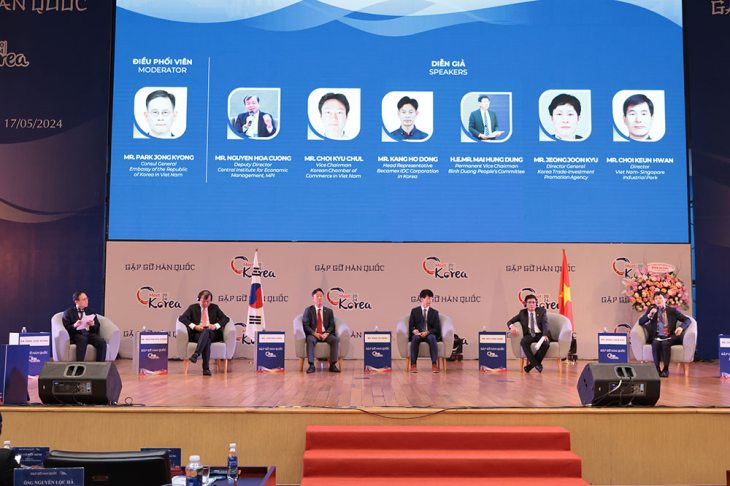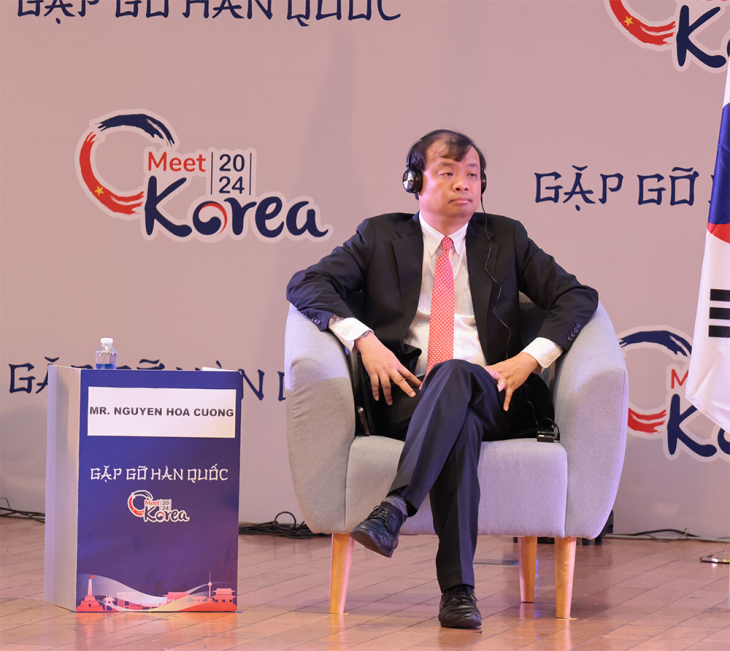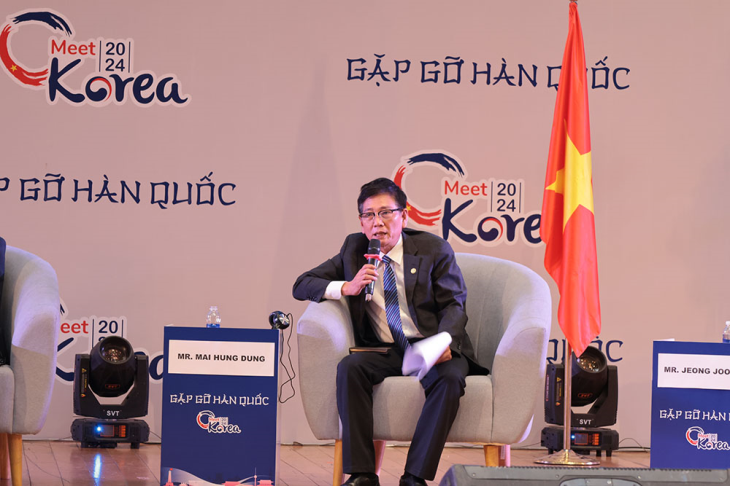The session was attended by the speakers: Mr. Nguyen Hoa Cuong – Deputy Director of the Central Institute for Economic Management; Mr. Choi Kyu Chul – Vice President of the Korean Chamber of Industry and Trade in Ho Chi Minh City; Mr. Jeong Joon Kyu - General Director of Korea Trade – Investment Promotion Agency in Ho Chi Minh City; Mr. Mai Hung Dung - Standing Vice Chairman of Binh Duong Provincial People's Committee (PPC); Mr. Kang Ho Dong – Head of Becamex IDC Office in South Korea; Mr. Choi Keun Hwan – Marketing Director of VSIP. The discussion session was chaired by Mr. Park Jong Kyong - Consul General of the Embassy of the Republic of Korea (RoK) to Viet Nam.

Speakers participating in the Discussion session
On the side of Binh Duong province, there were Mr. Vo Van Minh - Deputy Secretary of the Provincial Party Committee, Chairman of the PPC; Mr. Nguyen Van Loc - Member of the Provincial Standing Party Committee, Chairman of the Provincial People's Council; Ms. Nguyen Thi My Hang – Chairwoman of the Provincial Viet Nam Fatherland Front Committee.
Joining to overcoming challenges
Discussing cooperation between the two countries, speakers said that Viet Nam and the RoK are currently comprehensive strategic partners and each other's third largest trading partners. The two countries are working together to double two-way trade and investment by 2030. In the field of investment attraction, the RoK is the largest accumulated investor in Vietnam.
However, according to Mr. Jeong Joon Kyu - General Director of Korea Trade – Investment Promotion Agency in Ho Chi Minh City, facing the world's difficult situation and general instability, the global economy is facing 3 major problems, i.e., restructuring the supply chain, responding to climate change, and digital transformation. This has created many challenging factors for the economies of countries, including RoK and Viet Nam.

Mr. Jeong Joon Kyu - General Director of Korea Trade – Investment Promotion Agency in Ho Chi Minh City discussed at the session
To maintain the close economic relationship between RoK and Viet Nam and jointly respond to global challenges, the two countries need strategic orientations in the future. In particular, the Vietnamese Government needs to support South Korean enterprises in Viet Nam, especially manufacturing enterprises to improve their technological level. Vietnamese enterprises themselves must also improve their technological level.
In addition, Mr. Jeong Joon Kyu said that South Korean and Vietnamese economies commonly have a huge dependence on global trade. Especially the factor of importing semi-finished goods for the production of finished goods and export. Therefore, when the world restructures its supply chains, the two countries will be greatly affected.
"Currently, many South Korean enterprises have invested and participated in the supply chain in Viet Nam according to the trend of reducing production costs. However, with this trend, in the coming time, South Korean and Vietnamese enterprises need to switch to the supporting industry development structure to support the production process to create finished products without depending on imports. Additionally, to support South Korean enterprises, Viet Nam needs to have preferential tax policies and strengthen cooperation between the two countries in the garment industry." - Mr. Jeong Joon Kyu proposed.
At the same time, to attract and create a better environment for enterprises, the Governments of the two countries need to have reasonable legal directions and mechanisms, especially transparent information-sharing mechanisms. Local authorities should have many options to propose projects so that enterprises can participate.
In responding to climate change, the two countries should have new models of energy cooperation to reduce emissions and waste.
Mr. Jeong Joon Kyu also said that RoK is a thriving country with a value chain in information and communication technology (ICT); at the same time, we have experience in applying ICT to industry and life. In Viet Nam, the process of urbanization is strong and the demand for digital transformation is huge in the current period. Therefore, this will be an opportunity for South Korean enterprises to invest in this field. It also opens a new model of growth engine for Viet Nam, including the development of human resources in the field of ICT.
Mr. Nguyen Hoa Cuong - Deputy Director of the Central Institute for Economic Management shared that over the past time, Viet Nam has always created favorable conditions for investment and business activities. In addition, the Government has preferential policies, especially in high-tech industries and human resource development. Recently, the Government has approved the planning of different economic zones, which focuses on infrastructure investment. Vietnam's infrastructure has developed quite strongly. In particular, in the coordination work, leaders at all levels from the central to local levels have directly listened to the opinions of enterprises, to promptly remove difficulties and obstacles of enterprises, including South Korean enterprises.

Mr. Nguyen Hoa Cuong - Deputy Director of the Central Institute for Economic Management spoke at the discussion session
Binh Duong – an attractive destination for investors
Binh Duong is one of the localities in the Southern Key Economic Region which has made significant contributions to the economic development of the region and the whole country.
According to Mr. Mai Hung Dung - Member of the Provincial Standing Party Committee and Standing Vice Chairman of the PPC, to meet the needs of development and attract investment, in recent years, Binh Duong has always focused on synchronous transport connectivity in the region. In road connectivity, the province has been focusing on the construction of key roads such as Ring Road 3, and Ring Road 4; carrying out research and development of urban railways. In addition, the province is developing a strategy to develop rail and waterway transport to increase regional connectivity.

Mr. Mai Hung Dung - Member of the Provincial Standing Party Committee, Standing Vice Chairman of the Provincial People's Committee spoke at the discussion session
Along with that, Binh Duong is focusing on developing high-quality human resources. Currently, there are 8 universities, many colleges, and intermediate schools in the province. In addition, Vietnam National University, Ho Chi Minh City (VNU), and Nong Lam University, Ho Chi Minh City (NLU) are also located in the province. This is a great advantage for the province to develop high-quality human resources. The province is also cooperating with many famous universities in the world to train and develop human resources for the province.
In addition, Binh Duong is promoting its leading role, together with Becamex IDC Corporation to promote the formation of high-tech industrial parks; the development of green industrial parks; the development of trade and services; and focus on green transformation training. The province has included these orientations in the Binh Duong Provincial Plan for 2030, vision to 2050, and will be approved by the Prime Minister shortly.
According to Mr. Nguyen Hoa Cuong - Deputy Director of the Central Institute for Economic Management, with preferential policy factors in the high-tech industry; human resource development; and planning of economic zones, with emphasis on infrastructure development; the government listens to and supports businesses; creating favorable conditions for new local businesses, Binh Duong has increasingly attracted many businesses to invest, including many multinational corporations with huge investment capital. Specifically, Binh Duong has attracted 02 large foreign investment projects such as Lego Group's toy factory (Denmark) with a scale of more than 1 billion USD and the world's leading jewelry company Pandora (Denmark) with an investment of 150 million USD.